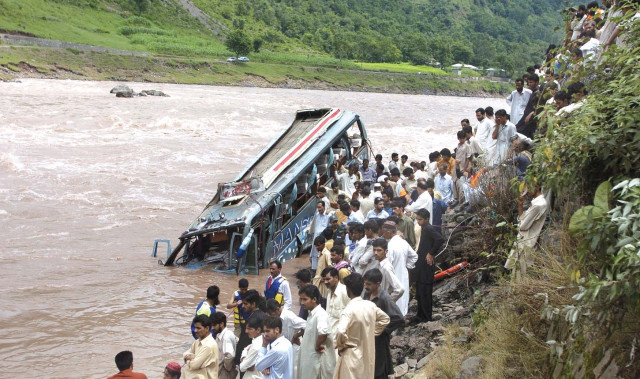Bus driver killings take a backseat to city’s violence
The lynchings of bus drivers are footnotes in the history of rioting in Karachi.

At least 50 drivers were murdered and 150 others were injured during ethnic and sectarian flareups that have taken place so far this year, according to the Karachi Transport Ittehad (KTI). Around 200 buses have been burnt.
Riots start within minutes and for a bus driver, who travels all over the city, the worst scenario is finding himself in the ‘wrong ethnic area’ at the time. According to the police, the routes from Mereweather Tower to Baldia and Orangi are the most sensitive and where most of the burnings have taken place.
Increasingly, as soon as they find out about a riot erupting somewhere in the city, the drivers simply abandon their buses and run for cover. “Once news of riots spreads, we try to park the bus at a nearby stand or somewhere on the roadside and jump out,” says Javed, a New Afridi route bus driver.
If a driver dies or is injured, there is no security system to fall back on. Neither the government nor the transporter unions necessarily help out. The men are left to the care of their families. Maria Bibi, 32, who lives in Shireen Jinnah Colony lost her husband in one of the riots in January. She recalls not being able to eat for 10 days. “He was brutally murdered,” she says. Neighbours told her that Khalid was shot in the head and abandoned at the roadside in Orangi Town. He was the sole breadwinner for their family and for his parents.
“He wanted to send his children to school, he told them to not even think of becoming a daily wage worker,” she says, adding that after he died the family was looked after by her brother-in-law. But because of the dismal turn their lives took, she had to send her eldest son to a workshop or the bus stand to earn some extra bucks.
The last thing she wants is for her son to become a bus driver like his father. “He will always remain tense [if he becomes a driver] and he will not be able to have a happy domestic life.”
Murtaza Hussain, 23, was a conductor for the Sheraz Coach when their vehicle was attacked near Jail Chowrangi. “The riots started suddenly. We were trying to get to a nearby safe place when suddenly a mob of youngsters blocked the road,” he recalls. The rioters first pelted the vehicle with stones and then torched it while he and the driver were still inside. The driver’s face and chest were burnt as were Hussain’s hands. They were lucky because the Rangers managed to get them out of the burning bus in time.
According to Husain, the owners of the buses always blame the drivers and conductors and if a bus is destroyed in a riot, the drivers find it very hard to get another job.
For their part, however, the owners of the buses claim that they do care for the life and security of the drivers. In most cases, however, the ultimate losers are the owners, they stress.
Tariq Rehman, who owns five buses that run on different routes and has his office in Saddar, says, “Yes, we feel bad for our employees [drivers and conductors] but at the end of the day we are the biggest losers. We lose both money and employees.”
He does not know why the transporters’ community is attacked in riots. “We are a public service entity. We serve people. It is totally unjust to attack our property since we have no part in the violence.” Rehman holds the government responsible for the damage.
Besides some major stakeholders, most of the buses are owned by individuals. “Some people own one, some two or three,” he says, “If a guy’s two buses are torched, it means that he has lost around half of his life savings. Then he cannot even support his own family - how would he support the families of injured employees?”
The Karachi Transport Ittehad says 5,000 vehicle owners are registered with them. The Karachi Bus Owners Association says they have 3,000 and the Karachi Mini Bus Owners Association says it has 2,000 members. “We try to compensate the owners from our own funds,” says Irshad Hussani Bukhari, president of KTI. According to him, the ittehad has established its own fund for which it charges Rs50 per day from every member.
“We have distributed Rs100 million among owners who lost vehicles so far,” he claims. He says the association usually pays around Rs200,000 to people who have lost buses during clashes. He adds that there is a misperception that the transporters are working under the supervision of one political party or the other which is why they are targeted. “For God’s sake, we are just labourers and businessmen. We have no political affiliations.”
Published in The Express Tribune, September 27th, 2010.


















COMMENTS
Comments are moderated and generally will be posted if they are on-topic and not abusive.
For more information, please see our Comments FAQ